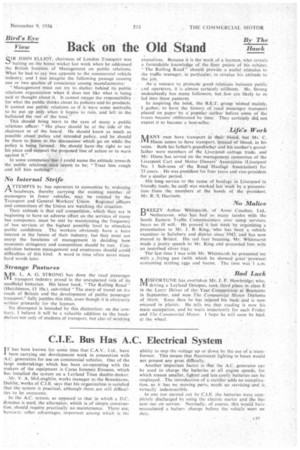Back on the Old Stand
Page 73

If you've noticed an error in this article please click here to report it so we can fix it.
SIIt. JOHN ELLIOT, chairman of London Transport was batting on the home wicket last week when he addressed the British Institute of Management on public relations. What he had to say was apposite to the commercial vehicle industry, and I can imagine the following passage causing one or two qualms of conscience among manufacturers: Management must not try to_ shelter behind its public relations organization -when it does not like what is being said or thought about it. It cannot escape the responsibility for what the public thinks about its policies and its products. It cannot use public relations as if .it were some umbrella to be put up only when it begins to rain, and left in the hallstand the rest of the time."
This should bring tears to the eyes of many a public relations officer: His place should be at the side of the chairman or of the board. He should know as much as possible about policy and intended policy, and he should be there to _listen to the discussions which go on while the policy is being formed. He should havethe right to say his piece and support the proposed line of action or to warn against it"
In some companies that I could name theattitude towards the public relations man seems to be; "Treat him rough
and tell him nothing." •
No Internal Strife
A TTEMPTS by bus operators to economize by widening 1-"k headways, thereby carrying the existing number. of passengers in fewer vehicles, may be resisted by the Transport and General Workers' Union Regional officers and committees of the Union are watching the situation.
Their attitude is that rail competition. which they say is beginning to have an adverse effect on the services of many bus companies, must he Met by maintaining the frequency of bus services at the highest possible level to stimulate public confidence , The workers obviously have a keen interest in the future of their industry. but they must not usurp the functions of management in deciding how economic stringency and competition should be met. Consultation between management and employees should avoid difficulties of this kind. A word in time often saves many hard words later.
Strange Pastures •• mR. L. A, G. STRONG has done the road passenger transport industry proud in the unexpected role of its unofficial historian. His latest book, "The Rolling Road" (Hutchinson, LI 10s.), sub-titled "The story of travel on the roads of Britain and the development of public passenger transport." fully justifies this title. even though it is obviously written primarily for the layman.
No disrespect is intended by this distinction: on the contrary. I believe it will he a valuable addition to the bookshelves' not only of students of transport, but also of working executives. Because it is the work of a layman, who reveals a formidable knowledge of the finer points of his-subject, "The Rolling Road" should provide a useful stimulus to the traffic manager, in particular, to revalue his attitude to the job.
Asa venture to promote goodrelations between public Lnd operators. it is almost certainly stillborn.. Mr. Strong undoubtedly has many followers, but few are likely to oe
led into these pastures. •
In inspiring the bdok. the •13.E.T. •group wished mainly. I. gather: to have the history of road passenger transport placedon paper by a' popular author before some of the traces became obliterated by time. They certainly did, not expect it to become a best-seller.
-.Life's Work
IkilANY men have transport in their blood, but Mr. C.
Hinns seems to have transport, instead of blood, in his veins. Both his father's grandfather and his mother's grandfather were. members of the LiverpOol cartage trade. and Mr. Hinns has served on the management committee of the Liverpool Cart and Motor Owners' Association (Liverpool No. 1 Sub-area of' the Road Haulage Association) for 33 years. • He was president for four years and vice-president for a similar period.
His long service -to the cause of haulage in Liverpool la friendly trade, he said) was marked last Week by a presentation from the members at the hands of the president. Mr: R: S. Harrison.
No Malice
D R EEZY Arthur Whitmarsh. of Avon Coaches, Ltd.,
Netheravon. who has had so many tussles with the South Eastern Traffic Commissioners over camp services. bears no ill will. He proved it last Week by organizing a presentation to Mr. J. B. King, -who has been a vehicle examiner in Salisbury and district since 1942; and has now moved to Bristol. His red face beaming. Mr. Whitmarsh made a pretty speech to Mr. King and presented him with an inscribed silver tray.
The last time I was with Mr. Whitmarsh he presented me with a frying pan (with which he showed great prowess) containing sizzling eggs and bacon. The time was .1 a.m.
• Bad Luck
4ISF0RTUNE has overtaken Mr: J. F. Howbridge: who. IVI driving a Leyland Octopus, took third place in class E in she Lorry Driver of theYear Competition at Brameote in September, and won The Commercial Motor Diploma of Merit. Since then he has injured his back and is now encased in plaster. He tells me. that reading is now his main occupation, and he waits impatiently for each Friday and The Commercial Motor. I hope he will soon be back at the wheel.




























































































































